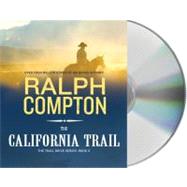An extraordinary saga of the trail-blazing cowboys who made their fortune
driving cattle from Texas to the Great Frontier.
Across the Pecos, the Rio Colorado and La Panza mountains, the Texans and their longhorns kept charging-all the way to California gold!
Between The Bandera Range And California, They Faced All The Challenges Of Man And God, But Nothing Could Ever Make Them Quit.
The only riches Texans had left after the Civil War were five million
maverick longhorns and the brains, brawn and boldness to drive them
north to where the money was. Now, Ralph Compton brings this violent and magnificent time to life in an extraordinary epic series based on the history-making trail drives.
The California Trail
Gold fever had hit California, and suddenly, the land was full of hungry pioneers. For Gil and Van Austin, two Texas brothers, it meant the chance to sell well-grazed longhorns after years of hard ranching and a treacherous cattle drive up through Mexico. The only trouble was that California was on the other side of a searing desert, swollen rivers, a barrage of Indian attacks, and a whole passel of outlaw trouble. And while the Texans and their men were ready and willing to take it all on, there was one thing they weren't prepared for: the ultimate act of treachery and deceit in a land of schemers, dreamers and gold!








